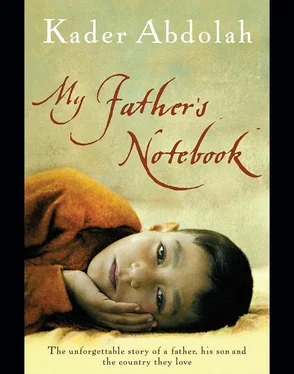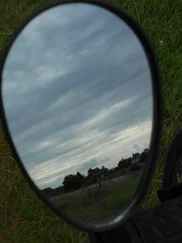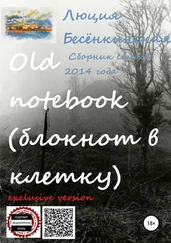“Shall we try it tonight?”
“Try what?”
“Going down to the sea together through the dunes, as soon as it starts to get dark.”
“You’re crazy,” Louis laughed.
“No, I’m not. I know how to do it. I’ve had a lot of training.”
“Training? What kind of training?”
“It’s a long story. I used to be active in an underground movement and we spent a lot of time in the mountains. The Cuban revolution was our shining example. We hoped to swoop down from the mountains one day with thousands of sympathisers, like Castro, and conquer the cities and overthrow the shah. We trained hard for that great day. We learned how to carry dead or wounded comrades through the mountains, but we never got a chance to put our training to use. Trust me, I know how to support a man who can barely walk. I can get you up and down those dunes.”
He didn’t answer. He stared at me, then at the dunes.
“We’ll go down to the sea on foot. Once we’re there, we’ll think of a way to get back.”
As evening fell and the grass rippled in the wind, Louis put his left arm on my right shoulder and we began our journey to the sea. He quickly lost his daring. His atrophied muscles wouldn’t cooperate. I changed position and offered him my other shoulder, but that didn’t help, either.
“You see, it won’t work,” he sighed.
I showed him how to position his left arm so that I bore most of the weight. I thought he could hobble along like a comrade who’d lost his right leg, but still had enough strength to walk on his left.
“This ought to do the trick,” I said.
It didn’t. I remembered what our instructors had said. Our wounded comrades needed to believe they would reach their goal. Our job was to make them think about the city we were going to conquer, rather than their wounds. To think about the dictator we were about to overthrow, rather than the remaining miles.
“I’ve got a story for you, Louis,” I said.
“OK, go ahead and tell me.”
“I’m working on a book.”
“A book?”
“Yes, I’m writing a book. A novel. In Dutch.”
“In Dutch? That’s interesting. What’s it about?”
“It’s about my father. Let me explain. My father kept a diary his entire life. He’d jot down a sentence, or a paragraph, or sometimes an entire page. But it’s a strange book.”
“What’s so strange about it?”
“I can’t read it.”
“Why not?”
“Because he wrote it in an unknown language — a kind of cuneiform that he invented himself. I look at a passage, then try to read it and transcribe it. No, ‘transcribe’ isn’t the right word. I try to translate it into Dutch.”
“Translate it when you can’t even read it yourself?”
“I’ll let you read the book when I’m finished.”
And as we talked, we reached the third dune.
It was dark, but I saw a glimmer of hope in his eyes.
Between the third and seventh dunes I told him what I’d written so far.
“Let’s sit down for a bit,” said Louis.
It started to rain, a light drizzle.
“You said you sometimes blame yourself for using your father for your own ends,” Louis said. “I don’t know the details, but if I’d been in your position, I think I’d have done the same thing. Did he, in fact, do what you asked?”
“Yes, that’s what hurts me so much now.”
Gradually, I let Louis depend more on his own legs than on my shoulder. I wanted him to feel his old route beneath his feet. It was probably not very sensible, since he might seriously damage his leg muscles, but all I could think of was his dream. Suddenly I realised that I was doing the same thing to Louis that I had done to my father.
It was wrong of me to force him. It was wrong of me to do his thinking for him. So, I put my arm around his waist and let him lean on me again.
Now we were getting somewhere. I began to tell him the rest of the story.
“You used to work in Iran, Louis, so you know that our border with the former Soviet Union was more than 1,200 miles long. It was heavily guarded. We were afraid to go anywhere near the border — we’d have been arrested on the spot. My father, on the other hand, could come and go as he pleased. Everybody knew him. The gendarmes took no notice of him, so he could roam as freely as a mountain goat. He went wherever he liked. We knew that a revolution was at hand and we believed that the shah would be overthrown within a few years. We had a lot of contacts with the Soviet Union, but our communication had to be routed through Europe, mostly through East Germany, which was quite a long detour. We needed a quicker route. The party wanted to be able to send messages to the Soviet Union and get an immediate reply. We needed someone who could get up to the border and back. Someone like my father.”
“Did he know that it was dangerous? That he could be sentenced to death if he were caught?”
“No, not really. I explained that it was dangerous and that he could be arrested. But he couldn’t fully comprehend the danger.”
“What exactly did he do for you — for the party?”
“I don’t know. They didn’t tell me. I was just supposed to give him a package and make sure he understood who he had to deliver it to. I would hide classified documents in his long black coat. He’d put it on and leave. Someone would be waiting for him at the border in another long black coat and they’d trade coats.”
“That was cruel.”
“I agree. Very cruel.”
“Did you stop to think what would happen to him if he got caught?”
“Yes. You can see the danger, but you’re so close to it that you’re … well, blind. You’ve been mesmerised by the dream. You have a totally different mindset, so you see things in a different perspective. To be honest, I thought my father probably would be caught. I assumed they’d torture him to find out who his contacts were, but I knew he wouldn’t cooperate. I explained that he couldn’t tell anyone about his contacts. I told him that the only sign language he was allowed to use was: I don’t know, I don’t know, I don’t know.”
“That was very unfair,” Louis said. “Hey, did you hear that?”
“Hear what?”
“The sea. We’re halfway there. You can always hear the waves from here when there’s a strong surf.”
I held my breath so I could hear it, too. But the sound of the surf was drowned out by the rain.
The wind blew even harder, flattening the grass. A wet moon peeked out from behind a cloud, then disappeared again.
Louis resumed the conversation. “The border area was heavily patrolled, so why was your father never arrested?”
“Have you ever heard of Mahdi, the twelfth imam?”
“No.”
“You must have heard about him when you lived in Iran. He’s a messiah figure. People believe he’s hiding in a water well near Saffron Village and that one day he’ll come out and relieve the world of its suffering. The well doesn’t ring any bells, either?”
“I’m afraid it doesn’t.”
“That’s probably because you worked in the southern part of the country, where people aren’t as religious. The sacred well is located in a remote spot on Saffron Mountain, not far from my father’s village. My father thought of this well as the centre of the universe. As an earthly symbol of God. I’m not religious, or even vaguely superstitious, but I can’t help thinking that my father’s belief in Mahdi was what saved him.”
Louis laughed.
“What’s so funny?”
“Nothing. Forget it.”
Now I, too, heard the sea. Louis’s hand trembled on my shoulder.
“Two more dunes and we’ll be able to see it,” he said.
“Can you keep going?” I asked.
“ I can, though I’m sure you’re exhausted from having to drag me all this way.”
Читать дальше












